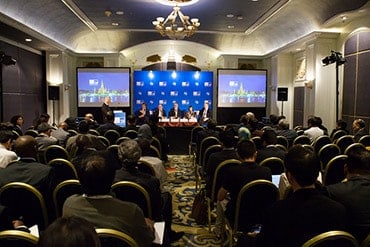
Is it realistic to expect the industry to produce business models supporting attainment of the SDGs? asked moderator Tim Unwin in a lively and open discussion at the end of the first day of ITU Telecom World 2016.
The SDGs can only be met by deploying ICTs, agreed the panel – and the industry only stands to benefit. Using the technology, expertise and money of the industry in support of the SDGs can make a huge difference to global growth and improving lives, as well as turning a profit, or in Luis Neves words, “We will make money and we will make society better.”
For Tomas the question is not whether it is feasible to match business models to the SDGs, but whether the industry can afford not to do so in its search for sustainable business models in a changing environment. From financing small businesses to health and agriculture, “SDGs are actually verticals enabled by connectivity”, and the social case is the business case for operators and their platforms.
The problem lies in part in the short-term nature of policy makers, according to Ole, where governments are elected for a few years only and do not address the big picture of the overall community long-term.
This may be why organizations such as GSMA, which are fully committed to meeting the SDGs, feel as if they are moving ahead of world governments prioritizing other issues beyond this “north star for humanity” guiding development, noted Lawrence Yanovitch. We need a clear social contract to enable the industry to deliver commercial services over a powerful framework through the core business, building new services with social impact on top.
Astrid echoed this false dichotomy between profit and social good, pocket or heart. Both must align. Lifting millions out of poverty does not happen by doing good but by making money: “as good as our hearts are, we need the resources to make it happen, we need balance”.
Neves pointed out that the cynical approach would be to accept that no matter whether the SDGs are achieved in part or whole or not all, “we will still be a business making money.” But this is a bigger issue, these are aspirations for humanity, and it is critical that policy makers understand the transformational power of technology.
Why then was establishing connectivity not itself one of the SDGs? In part because of the “bubble” in which many live where access is like air; but the heart of the issue, the panel agreed, is that the transformational effects of technology are not understood. ICTs are not, as Astrid pointed out, a “magic bullet to make development happen”, but it is a tool to be wielded by leaders around the world to empower those who have been left behind.
CSR may be merely a communication tool around corporate activities, or it may make a real contribution to development in certain narrow cases, but a different approach is needed to embed sustainability into business. For Yanovitch, it echoes the paradigm shift between the corporate governance of the last century based on short-term profits with CSR for community relations, to today, where contributing to society must be part of the core business agenda.
We need as many producers and contributors as possible from all different verticals to work together on integrated solutions to integrated issues, from the empowerment of digital entrepreneurs to social benefit applications. And as the market grows, so too will the ICT industry as the enabler of those services.
But it is not just down to the big corporations to make it happen, as just one player om the ecosystem, stressed Astrid. “They are not experts on development but on business”, agreed Tomas. Technology may have contributed to inequality – but it doesn’t have to, if deployed properly. We need to build a sustainable model focusing on long-term benefits and opportunities, and above all, not lose sight of the magical transformational potential of ICTs in human lives.
Moderator
- Professor Tim Unwin, Emeritus Professor of Geography and UNESCO Chair in ICT for Development (ICT4D), Royal Holloway, University of London, United Kingdom
Opening Remark
- Dr Chaesub Lee, Director of ITU’s Telecommunication Standardization Bureau, International Telecommunication Union, Switzerland
Panellists
- Mr Tomas Lamanauskas, Group Director Public Policy, VimpelCom Group, Netherlands
- Mr Luis Neves, Chairman, Global e-Sustainability Initiative (GeSI), Belgium
- Mr Ola Jo Tandre, Director and Head of Social Responsibility, Telenor ASA, Norway
- Dr Astrid Tuminez, Regional Director, Corporate, External and Legal Affairs (Southeast Asia), Microsoft, Singapore
- Mr Lawrence Yanovitch, President of the GSMA Foundation, GSMA, United Kingdom
